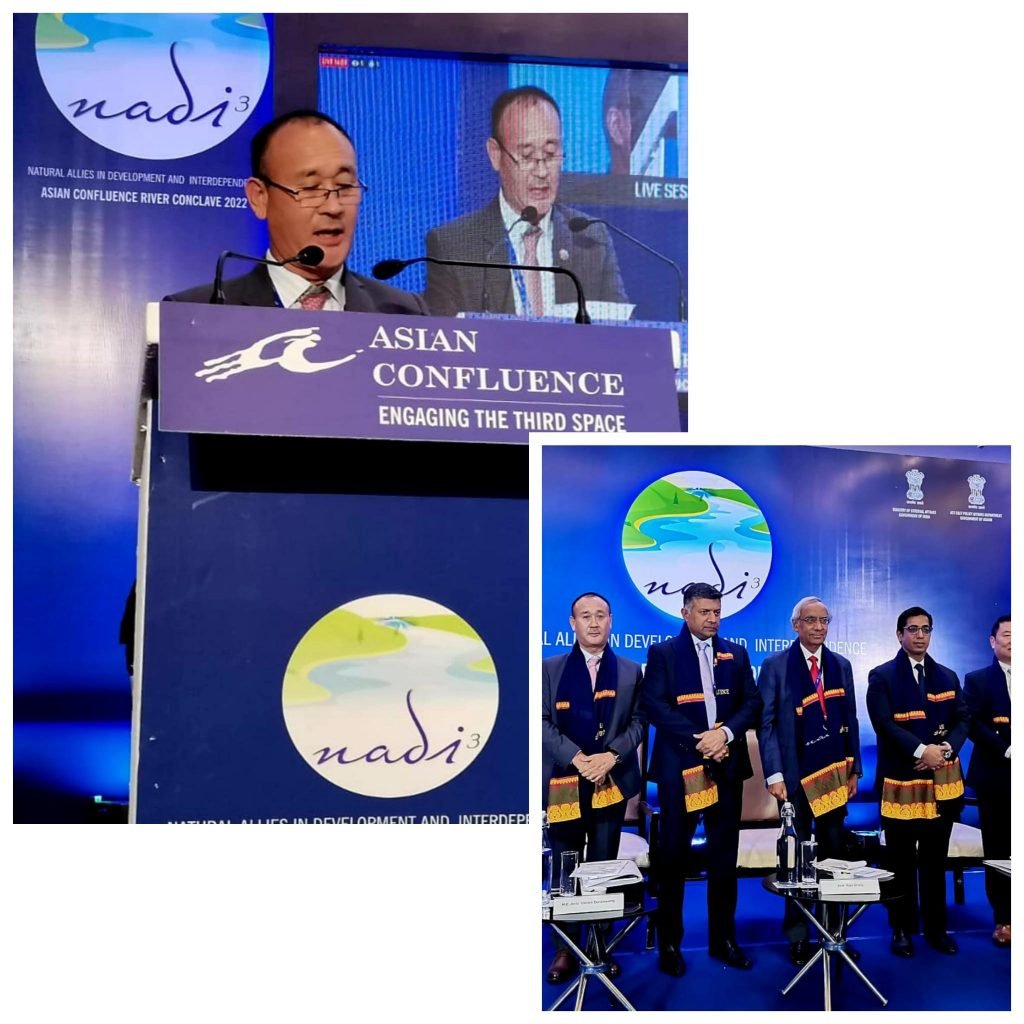

Remarks by
H.E. Tenzin Lekphell, Secretary General of BIMSTEC
at the Natural Allies in development and Interdependence (NADI)
Asian Confluence River Conclave 2022
28-29 May, Guwahati, India
Rivers of the Bay of Bengal:
Connecting the Blue economy, the mountain economy and the plains economy
The Honorable Chair, Ambassador Rajiv Bhatia,
H.E. Amb. Vikram Doraiswamy, High Commissioner of India to Bangladesh,
Ambassador Shahidul Haque, Former Foreign Secretary of Bangladesh
Dr Pema Jamtsho, Director General of ICIMOD
Distinguished Participants, Ladies and Gentlemen
It is a great pleasure for me to be in Guwahati after a long time.
I am also honoured to participate in this important Nadi 2022 Dialogue on the theme “Rivers of Bay of Bengal: Connecting the Blue Economy, the Mountain Economy and the Plains Economy” being attended by dignitaries and personalities from various professional backgrounds.
I would like to sincerely thank the Asian Confluence for giving us this platform to share our thoughts and experiences.
The BIMSTEC Secretariat looks forward to our continued cooperation.
Excellencies, Distinguished Delegates, Ladies and Gentlemen
Rivers as we all know are very important and they are the lifeline for all forms of life. All the civilizations in our world were born and developed on the banks of rivers.
We are fortunate that the BIMSTEC besides having unique geographical position and strategically located as a bridge between South and South East Asia providing opportunities and potential to increase trade between the two regions, is also blessed with rivers that connect the high mountainous regions with the low lying regions - providing openings for livelihood, economic growth and serving as a vital regional ecosystem
Mountains are a substantial part of the BIMSTEC region with around 23% of total land area.
It’s a home to about 140 million BIMSTEC people and a further one and half billion people downstream depending directly or indirectly on the mountains for a range of goods and services, including water, energy, food, and biodiversity.
Therefore, realizing the importance of Mountain Economy for the region, the 17th Ministers Meeting held last year on 30th April and our Leaders during the Fourth BIMSTEC Summit underscored the necessity of making efforts to ensure conservation of the mountain ecosystem and decided to establish an Intergovernmental Working Group on Mountain Economy.
Currently, the Secretariat is in the process of getting nominations from the member states to form the Working Group on Mountain Economy and develop its Plan of Action.
Similarly, recognizing the enormous wealth and potential that the Bay of Bengal Region has in its waters and oceans, the BIMSTEC Leaders during the Fourth BIMSTEC Summit emphasized the importance of blue economy and agreed to cooperate in this sector and decided to establish an Inter-governmental Expert Group and develop an action plan on BIMSTEC Blue Economy.
We are in the process of formulating this Expert Group.
Excellencies and Distinguished Delegates,
BIMSTEC aspires for seamless connectivity in the region and therefore the adoption of the Master Plan on Transport Connectivity by the 5th BIMSTEC Summit is a milestone in this regard.
The Master Plan is a 10-year strategy for enhanced transport and trade linkage through the development of physical infrastructure including roads, railways, ports, inland waterways and airports with soft components such as capacity building, access agreements and harmonization of rules, regulations, policies and measures related to transport between and among BIMSTEC Member Countries.
The presence of large rivers in our region and the vital role that the inland water transport provides in enhancing regional connectivity has been emphasized in the Master Plan.
The landlocked BIMSTEC member states like Bhutan and Nepal for example will benefit from the inland waterways in India and Bangladesh through multimodal and intermodal connectivity as it provides access to the sea and seaports from where goods are transported.
A number of flagship projects of inland water transport in the BIMSTEC region are reflected in the Master Plan.
We hope that the member states will take advantage of the plan and implement the components of the Masterplan which will ensure the achievement of our aspiration for a truly connected Bay of Bengal Region.
On the other hand, while strengthening transport connectivity in BIMSTEC region is exciting and will bring benefits, we must also consider and address the possible negative consequences that it can bring to our fragile mountains, rivers and oceans that are crucial towards achievement of the Sustainable Development Goals.
Therefore, BIMSTEC has identified Environment and Climate Change as one of the seven pillars of its sectors of cooperation and Bhutan has been identified has the lead country in this sector.
A Joint Working Group has already been formed for Environment and Climate Change, which is likely to meet in August this year in Bhutan and finalize the plan of action.
Excellencies and Distinguished Delegates,
After a two year Covid-19 induced delay, BIMSTEC concluded its fifth Summit on 30th March 2022.
During this summit, besides witnessing progress by signing several Conventions, Memorandum of Associations, Adoption of Master Plan, Approval of reorganization of 7 focus areas, the Summit marked an important milestone by signing the BIMSTEC Charter by our leaders.
To further strengthen BIMSTEC Institution, India committed one million USD to rejuvenate the Secretariat towards its operational budget during the 5th Summit.
Excellencies, BIMSTEC hopes to build on this momentum and reassure the region that it is on track to realise a prosperous Bay of Bengal Community.
With these few words, I would like to once more extend my deep appreciation to the Asian Confluence led by Mr. M.P. Bezbaruah [Chairman of Governing Council, of Asian Confluence] for organizing this Dialogue and giving us the opportunity to participate.
Thank you